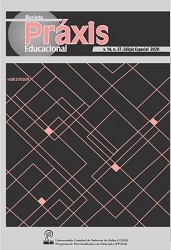EDUCATIONAL POTENTIAL OF INFORMATION AND COMMUNICATION TECHNOLOGIES IN PATRIOTIC EDUCATION OF STUDENTS
DOI:
https://doi.org/10.22481/praxisedu.v16i37.6404Palavras-chave:
Tecnologias da informação e comunicação, Educação patriótica, Instituições de ensino, Desenvolvimento inovadorResumo
O potencial educacional das tecnologias da informação e comunicação na educação patriótica dos alunos é investigado e fundamentado no artigo. Conduzindo um experimento pedagógico, foi comprovado teoricamente e praticamente comprovou a eficiência do uso de tecnologias da informação e comunicação na educação patriótica dos alunos. A experiência do trabalho de instituições de ensino médio em educação patriótica é analisada, métodos de diagnóstico para estudar o nível de educação patriótica dos alunos em instituições de ensino médio geral são selecionados e implementados. O conjunto de métodos de diagnóstico aplicados com o objetivo de revelar o potencial educacional das tecnologias da informação e comunicação na educação patriótica dos estudantes é fundamentado. Também elaboramos o sistema de indicadores de qualidade dos principais componentes da educação e dos critérios patrióticos. Com base na análise da literatura psicológica e pedagógica e no estudo das idéias dos cientistas, quatro níveis de educação patriótica foram cientificamente substanciados por certos critérios e indicadores. A escala dos critérios correspondentes de indicadores que levam em conta indicadores de sua aparência em 0-3 pontos executa-se.
Downloads
Referências
Bukanov H., Kolesnyk A., Tashkinova O., Kotlubai V., Koval V. (2019). Social marketing in public administration of social service institutions. Revista Genero & Direito, 8 (6), 457-468.
Chace, J. (1997). An Extraordinary Partnership. Marshall and Acheson, 76, 191-194.
Chernega, P. (2012). Ukrainian ethnopedagogy - the science of the content, principles and methods of folk pedagogy of Ukrainians. The main directions of formation of professional qualities of specialists in educational work in the armed forces of Ukraine, 4, 65-67
Cichosz, W. (2013). Możliwości dialogu wychowania chrześcijańskiego ze współczesną edukacją polską. Wydawnictwo „Bernardinum”, Pelplin.
Demyanchuk, A. (2019). Psychological and pedagogical features of patriotism formation in senior preschoolers. Psychological and pedagogical bases of humanization of educational process in school and high school, 1, 13-20.
Dukhnovich, A. (2009). Folk pedagogy in favor of scientists and teachers. M.: Pedagogy.
Frączek, Z. (2006). Ojczyzna jako wartość edukacyjna w obliczu integracji europejskiej. in: Janiga W. (ed). Wychowanie do patriotyzmu. Przemyśl–Rzeszów, 3, 457–463.
George, F. (1946). "Long Telegram". The Makings of America: The United States and the World, 2, 299-303.
Goncharenko, C. (1997). Ukrainian Pedagogical Dictionary, 1, 34-36.
Janiga, W. (2004), Wychowanie patriotyczne dzieci i młodzieży w świetle dyrektorium katechetycznego i podstawy programowej katechezy kościoła katolickiego w Polsce. Resovia Sacra, 11, 213-225.
Kapska, A. (2001). Actual problems of social and pedagogical work (modular course of distance learning): Educ. Tool, 5, 119-129.
Koval, V., Polyezhayev, Y., & Bezkhlibna, A. (2018). Communicative competences in enhancing of regional competitiveness in the labour market. Baltic Journal of Economic Studies, 4(5), 105-113. doi:10.30525/2256-0742/2018-4-5-105-113
Kvitka, S., Starushenko, G., Koval, V., Deforzh, H., & Prokopenko, O. (2019). Marketing of Ukrainian higher educational institutions representation based on modeling of Webometrics Ranking. Marketing and Management of Innovations, 3, 60-72. http://doi.org/10.21272/mmi.2019.3-05
Machuska, I. (2003). Pedagogical substantiation of the content of the program "Culture of interpersonal communication in the family", 6, 167-169.
Mishchenko, H (2004). What is the germ of patriotism? Native School, 2, 1-8.
Muszyński, H. (1996). Niektóre problemy kształtowania postaw patriotycznych dzieci i młodzieży. Kwartalnik Pedagogiczny, 3, 51-68.
Pustovit, G. (2015). Patriotic upbringing in the content of extracurricular education: present and prospects, 4 (20), 97-103.
Shinkaruk, B (1986). Patriotism: A Philosophical Dictionary, 2, 46-48.
Shynkarenko, B (2017). Information technologies as a means of patriotic upbringing of pupils in the educational process of secondary schools, 2 (12), 174-178.
Shynkarenko, In (2018). Criteria and indicators of patriotic upbringing of high school students in the educational process of institutions of general secondary education, 2 (94), 156-170.
Vygotsky, L. (1991). Pedagogical Psychology, M.: Pedagogy.
Zyazyun, I (2000). Pedagogy of the good: ideals and realities: Scientific method. K .: MAUP.
Downloads
Publicado
Como Citar
Edição
Seção
Licença
Você é livre para:
Compartilhar - copia e redistribui o material em qualquer meio ou formato; Adapte - remixe, transforme e construa a partir do material para qualquer propósito, mesmo comercialmente. Esta licença é aceitável para Obras Culturais Livres. O licenciante não pode revogar essas liberdades, desde que você siga os termos da licença.
Sob os seguintes termos:
Atribuição - você deve dar o crédito apropriado, fornecer um link para a licença e indicar se alguma alteração foi feita. Você pode fazer isso de qualquer maneira razoável, mas não de uma forma que sugira que você ou seu uso seja aprovado pelo licenciante.
Não há restrições adicionais - Você não pode aplicar termos legais ou medidas tecnológicas que restrinjam legalmente outros para fazer qualquer uso permitido pela licença.












